- Home
- Mark Zubro
Dying to Play Page 8
Dying to Play Read online
Page 8
“Rotella should have questioned them,” Dowley said.
Smith sighed, “He did after the first few notes and got nowhere.”
“Maybe we should try,” I suggested.
“I tell you, we’ve asked that kind of thing before,” Smith said. “Nobody admits anything.”
“You can’t do nothing,” Dowley said.
I asked, “Why not give it a try?” Unless Smith had a reason to keep me from asking questions, this was the kind of opening I was looking for. Whether Smith figured this out, or reasoned that he didn’t have a choice, he gave in.
First, he summoned the guard for the locker room door. It was Kosta Boone, a kid still in his teens. He didn’t wear a uniform, or have a gun. He had a badge on the shoulder of his short-sleeve blue shirt that said “Security.”
The kid said, “I watched the door. I only let players in and the guys who worked for the team. Nobody else got in.”
“You step out to look at the game?” I asked.
He hesitated then mumbled, “Ah, no.”
I’d bet my best mitt he was lying.
“Step away to go to the washroom?” I asked.
“The washroom’s in the clubhouse. I’d have seen anyone. It only took a second.”
“Step away to talk to your girl?” I asked.
“No.” He was getting a little defiant.
I asked, “Who checks the people using the weight room?”
“Not me. It’s a separate door. People with season passes show them at the gate to get into the park and then take a separate entrance.” The kid left.
I asked, “How does access to the weight room work?”
Smith said, “When they come through the turnstile, they can show their yearly season pass and walk right in. They know they’re not supposed to come in here. It says so on their season pass.”
“Who was in charge of watching the door from the weight room to the locker room?”
“Nobody. It’s never been a problem.”
“Who checks the passes at the turnstile?”
“The kids who work at the gates. They’re also the ones who do the cleaning. They’ll still be here.” He sent for them. While we waited, he said, “They’re mostly college kids doing summer jobs. Nice kids.”
All of them reported numerous people with season passes using the weight room. No one had watched as the patrons turned to go to the special entrance.
The equipment manager and the trainer admitted to being in and out of the locker room. They claimed they saw nothing.
Before they all left, we made a general announcement to the team. Dowley and I stood next to Smith who did the talking. There were grumbles, grunts of frustration, and several calls of dismay, but none of them admitted seeing anything.
TUESDAY 10:30 P.M.
Again, I met Marty Murray at the Pitstop TruckStop. He was in the same back booth that I’d met him in before. With him was a man who looked to be about Murray’s age but going prematurely bald. I sat down and was introduced to Dr. Frank Ericson who said, “I’m not supposed to be here. I could get in a lot of trouble for this, Marty.”
I said, “I’m not interested in getting anyone in trouble. If you don’t want to talk to me, that’s fine. Either way, I’ll forget we ever met.”
“That’s not as reassuring as I’d like it to be,” Ericson said. “The reason I came is because I don’t understand what’s going on. I trust Marty. We grew up together. He says it’s okay to trust you.”
Murray said, “Frank’s on the staff of Butterfield Memorial Hospital. He examined Skeen when he first came in. He’s seen the pathology report.”
A waitress came by. Murray and I ordered coffee. Ericson got nachos and a diet soda.
“What’s going on that you don’t understand?” I asked.
“All the reports have already disappeared on this case. All the regular doctors have been shoved aside. We’ve got interference.”
“Who’s making it happen?”
“It has to be hospital administrators.”
I asked, “Somebody can just make the Medical Examiner go away? People can practice medicine without a license? They can just walk in and get admitting privileges?”
“The hospital brass keep having meetings. It’s like after each meeting, something else odd happens. Right now, it’s as if Tyler Skeen never existed. For people working inside or outside the system, that shouldn’t be happening.”
I asked, “How’d you find out there was a problem?”
“I needed to look in the files to finish some paperwork. Last night they were gone. I asked a few questions and was told it was out of my hands. I was the one who examined him when he came in. I was the admitting physician. I’m the one who’s responsible if something goes wrong or if someone has questions. They told me reporters wouldn’t bother me.”
“The reporters are in on it with the team or with the hospital?” I asked.
“I don’t know that part. All I know is, I don’t have access anymore.”
Murray said, “Nobody’s talked to me or tried to silence me. But he’s right, Frank’s name is never mentioned when somebody talks to us. Rotella, the chief of police, handles all questions.”
I said, “Is there any way I could talk to other hospital personnel?”
“You can’t,” Ericson said. “If you do, they’ll know the information came from me. You can’t jeopardize my job.”
I held out a hand. “I won’t do anything without letting you know.” I’d have to find some way of talking to the hospital people.
“What killed him?” I asked.
“When the tests come back, we’ll know for sure, but someone brought in the pills that they found in his condo. I could open a drugstore with all the different stuff he had. Like I told Marty, I know it was his meds. They got whisked away pretty quick, but not before I specifically examined the pills he had on his night stand. Some of the pills left inside were the correct prescription, but some were not.”
“The pills looked that much alike that he’d make a mistake?”
Ericson said, “He had one of those daily pill containers. You’ve seen them. The kind with the day of the week on each little compartment. Of the seven compartments, three had pills. Four were empty. Each of the filled compartments contained eight pills.”
Murray asked, “He took that many each day?”
“Apparently,” Ericson said. “The police only found three prescriptions. About half of each was left in the original plastic containers. No one knows where the other pills came from.”
“Did the police talk to the pharmacist where he got the prescriptions filled?” I asked.
“Yes. The pharmacist is here in Butterfield. He claims that he gave exactly the right dosage for the prescriptions and that he gave the correct pills for those prescriptions, so the pharmacist isn’t seen as being the problem.”
I asked, “Would he admit it if he’d done something wrong?”
Murray said, “I know Harold Zaun. He has been in town two years. He graduated from the University of Wisconsin. I’ve got a source that says police have examined all of his records, and that they’re all in order. Nobody’s looking at Zaun. He’s in the clear.”
“Was Skeen going to local doctors?”
Murray said, “Bill Rohden consulted with Skeen’s regular doctor from the big club. Rohden’s a local man. Been a doctor in this town for forty years. Rohden’s got an impeccable reputation. Only the team doctor was prescribing for Skeen.”
I’d want to try and talk to any pharmacist or doctors myself. Never trust secondhand information was one of the dictums I lived by. I almost screwed up my first case because of that. Two people nearly died. I’d been lucky.
I asked, “What about the herbal remedies Old Charlie Hopper sells? Was Skeen using them? Was there a combination of them that, with his prescriptions, wittingly or unwittingly could have killed him?”
Ericson said, “I don’t know anything about what Hopper peddles.” He tu
rned to Murray. “You buy drugs from Old Charlie?”
Murray blushed, “Sometimes I need a pick-me-up.”
Ericson thumped the table and frowned at Murray, “It’s snake oil.”
I asked, “What was it exactly that killed him?”
Ericson turned to me. “We’ll get technical names when the tests come back.”
“Why didn’t he just get sick?” I asked.
“The meds didn’t work that way,” Ericson said.
I added, “Or maybe he was too drugged up, doped up, or drunk to notice something was wrong.”
Murray said, “Lot of suspects. Anybody could have gotten to his meds. Half the town and most of the team has been to his condo for parties.”
Everybody was silent for a few moments, sipped coffee, or diet soda. Ericson ate some of the nachos he’d ordered.
Finished chewing, Ericson asked, “Why get rid of all the paperwork at the hospital?”
I said, “Simplest reason, somebody wants to control the information. Could he have possibly mixed them up accidentally or simply not have known a combination might be lethal? Maybe nobody did anything wrong.”
Ericson shook his head. “This much is certain, somebody switched meds. I saw the bottles. I saw the prescriptions. I took accurate notes. Those haven’t disappeared. I’ve seen the meds themselves. They don’t match. There were too many and some were switched. It’s murder. This was no accident. I’d bet my reputation on it. Your problem is finding out who knew what he was taking and who knew what would react with what.”
Ericson knew no more. After he left, I asked, “You sure your buddy is right? You trust him.”
“Implicitly.” He sipped coffee. “The only other thing new I’ve got is a rumor on a crazed fan. Guy named Edwin Hempil follows the team around to different cities. He was harassing Skeen.”
“Would he have been able to get into the parties at the condo? Would he even know which meds Skeen was on?”
“He wouldn’t have needed to know which specific meds he was on as long as he had meds to substitute.”
“Sure he would. Skeen was on lots of different little pills. He’d have to know if he needed to leave big ones or small ones, green ones or pink ones or little purple ones. I’m not going to rule it out, but I don’t think it’s likely that we’re going to have a crazed fan at the bottom of this.”
Murray said, “This guy comes to all the games. You can probably see him tomorrow.” He leaned closer. “I can get you into Skeen’s condo.”
I asked, “How did you get access, and why would you want to share that with me?”
“I’m a nothing reporter for a two bit paper. You’re a big shot detective with a name in Chicago. It is to my advantage to hitch myself to your star. I’ve got some connections in town. You’ve got an “in” to the team. I might be able to do a little more for you now, but you might be able to do a great deal for me later. I’m willing to risk a trade. Besides, I’ve got a key.”
“How’d you get it?”
“I called the builder. He’s my brother-in-law. Butterfield’s not that big a town.”
“When we search his condo, what are we going to find that the police didn’t?”
“We won’t know unless we go.”
I figure obeying the law is important. Getting help in a murder investigation is too. Besides, we had a key. It wasn’t totally illegal.
TUESDAY 11:45 P.M.
We sat in Murray’s car in the parking lot of Skeen’s condo. I’d taken my flashlight out of my car. I asked, “Skeen’s in town for a relatively short time, but he buys a luxury condo?”
“He could probably buy most of the town. Tyler Skeen was used to living in luxury.”
“Where does the entourage live?”
“They rented an immense old mansion on the other side of the tracks from you. The much better side of the tracks about a mile or so down toward the ballpark. When you drive to the park, it’s the huge pink place.”
I raised an eyebrow. I remembered the huge old Victorian mansion.
“The last owner was eccentric.” He pointed to the condo. “Sometimes partygoers stayed overnight in the condo. There’s lots of rooms.”
I rolled down the window. The restive night noises of insects and critters pulsated in the air. I could feel the heat radiating from the still-warm surface of the parking lot of the luxury enclave. In front only two of the visitors’ spaces were filled. Tenants parked in the back. The condo overlooked an artificial lake. No street lights, no sodium arc lights, just trendy “spots” that illumined little except the five-foot diameter circles they shed.
Crime scene tape hung on the condo’s front door, but there was no guard. An overgrown, potted evergreen bush with yellowing leaves blocked the entryway from the view of the parking lot. Skeen’s condo was the end unit. One of the trendy spots lit about half the entrance.
Murray unlocked Skeen’s door. We ducked under the tape and slipped inside. The first thing I noticed was the air-conditioning was off. We didn’t turn on any lights. I dug out my flashlight and narrowed the beam to a pinpoint.
Lights from a shallow pool with live fish sparkled off the mirrors on the vaulted ceiling of the entryway. The marble floor was first class. Bland paintings filled with multi-colored blobs hung on the stucco walls.
I eased open a door on the right side of the hall and found a theater with twenty seats. The first door on the left led to a ten-foot-deep closet with designer clothes crammed in every available space. The drapes in each room were closed. I carefully wiped each surface I touched. I whispered to Murray to do the same.
In the living room, empty potato chip, nacho, and cheese popcorn bags mingled with bones of buffalo wing leftovers. These along with bowls of rotting dip covered everything: the coffee table, end tables, the cushions on the sofa, any random flat surface, which included a great deal of the floor.
In the kitchen, bottles and cans of beer filled the refrigerator. Empty liquor bottles obscured the entire surface of every cabinet. Several large basins on the floor contained two-inch deep placid bits of water, probably remnants of ice. Two four-foot tall metal garbage cans overflowed with liquor containers and party detritus. Cigar and cigarette butts spilled from overflowing ashtrays. Some smokers had even stubbed them out on tabletops, leaving reeking butts and smears of burn scars. Bits of chips crunched on the European Eucalyptus flooring.
I’m not big on cleaning, and I have a few ex-boyfriends who will attest to my predilection for untidiness, but this was out of control.
Keeping my voice low, I asked, “He doesn’t have a cleaning service?”
“Maybe they only come in every other day.”
“From the looks of this place, they’d have to come in every other minute.”
In an office there were papers strewn across the top of a desk. They seemed to be ordinary bills and messages. Nothing of consequence. No stack of threats.
In the living room a DVD player connected to a fifty-six inch flat screen television: lots of DVD’s, mostly old westerns, two porn tapes, heterosexual couples on the covers; no books to read anywhere.
No bottles of drugs. No stacks of pills. Nothing in any shirt or pants pockets we hunted through. The police had been thorough, or there was nothing to find.
The bed in the master bedroom wasn’t made. Piles of clothes sat on the floor. The message light on the answering machine blinked.
I played the message. A mechanical voice said, “Message received at twelve eighteen Wednesday morning.” That would have been a few minutes before we turned the key in the lock. The message itself came across muffled and low. It said, “I know you two are in there. Stay as long as you like. You’ll die soon enough.” I flicked off the flashlight.
“We better get the hell out of here,” Murray whispered.
“Who’d you tell we were coming here?”
“Nobody. I swear to God.”
“Your brother-in-law?”
“He’d never say anything. I didn’
t tell him when I was going. We get along great.”
“Then somebody’s watching the place.”
“Why?”
“We don’t know that yet.”
“Maybe they’re in here. Maybe they’re watching us right now.”
I whispered, “We need to be more careful, and more quiet. We need to check all the exits.”
Murray headed for the front door. I grabbed his elbow.
Murray said, “What if he can watch all the exits, windows and doors and everything?”
I said, “And there could be more than one person out there. I want to look at each exit and see which one is darkest.”
The condo was built on a slope, two floors in front but three in back. Floors one and two didn’t show any unlit easy exit. We headed up to the third floor. We kept to shadows and moved quietly on the thick carpet past two unfurnished bedrooms to a fully furnished one. To the left as we entered, an open door revealed a shadowed bathroom with a sunken tub. A large plate-glass sliding door led to a third floor balcony, which was surrounded by a wrought iron railing.
Moonlight flooded the doorway and the room in front and to the left of us. Deep darkness covered the right half of the room and the right half of the sliding door. I could hear night sounds from outside. Murray bulled forward. I grabbed him and pulled him back.
“What?”
I pointed. In front of the left side of the door, I saw an irregular mound.
“What’s that?” he asked.
I inched closer.
Murray huddled behind me.
It was a body.
It wasn’t moving.
It was Czobel.
The amount of blood around the body seemed to preclude a need to feel for a pulse, but I needed to be sure. Keeping to the shadows as best I could, I got next to the body, knelt on one knee, and touched the cold skin over the carotid artery. He was dead. Shards of plate glass lay between him and the outside. The screen had two round holes in it. Two bullets passing through the screen must have shattered the glass. The other floor to ceiling pane of glass was still intact.

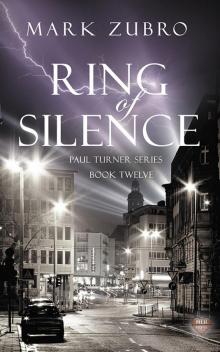 Ring of Silence
Ring of Silence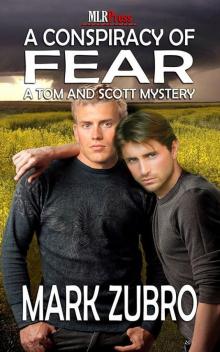 A Conspiracy of Fear
A Conspiracy of Fear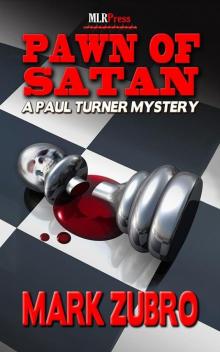 Pawn of Satan
Pawn of Satan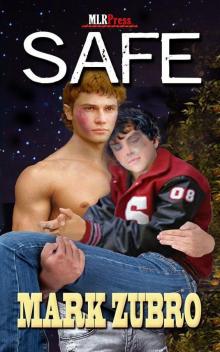 Safe
Safe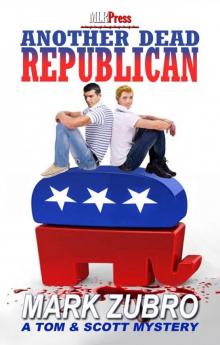 Another Dead Republican
Another Dead Republican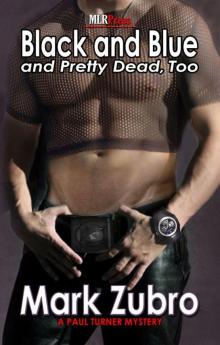 Black and Blue and Pretty Dead, Too
Black and Blue and Pretty Dead, Too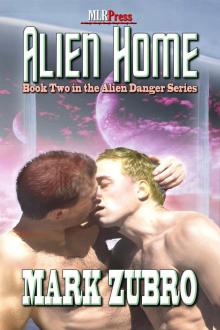 Alien Home
Alien Home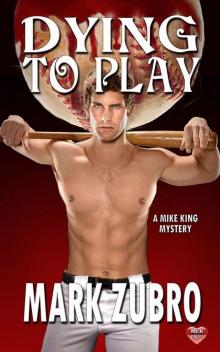 Dying to Play
Dying to Play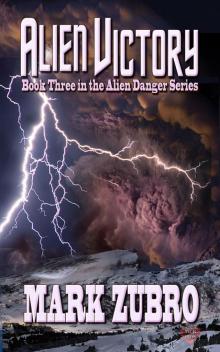 Alien Victory
Alien Victory